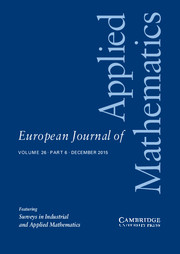Article contents
Singular systems analysis as a moving-window spectral method
Published online by Cambridge University Press: 01 February 1998
Abstract
Singular Systems Analysis (SSA), or time domain Principal Component Analysis (PCA), is most appropriately analysed in terms of local, moving-window spectral analysis. The behaviour of Empirical Orthogonal Functions (EOF) of this theory are examined, for continuously sampled data, in the limits of large and small window length, and for centre or end projection. Filters obtained by projecting on to these EOFs are shown to approximate local, linear band pass filters, where the EOFs depend upon the correlation structure (or the power spectral density) of the signal and the window length. Power in the spectra is not generally conserved, and projection to the endpoints of a window may not converge to the underlying signal in the absence of noise. The filters are independent of the phase of the Fourier transform, and are therefore unable to distinguish dynamically between a signal and a surrogate (phase-randomized) transform of it. Iteration of such local filters using a prediction error-based stopping criterion can and does lead to improved results, but the choice of window length must be made a priori. Hence, we introduce an iterative local filter with the window length being determined as part of the filtering procedure. This involves the determination of the predictability of the projected time series, and hence allows SSA to be used in a genuinely nonlinear way.
- Type
- Research Article
- Information
- Copyright
- 1998 Cambridge University Press
- 3
- Cited by


